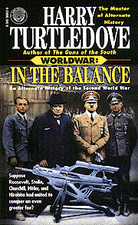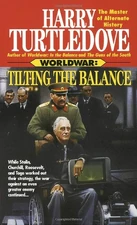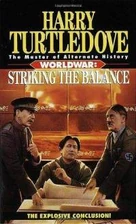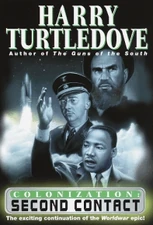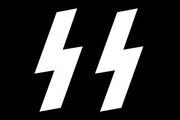
The Sigrunen (lightning bolts) are the most recognizable symbol of the SS and are implemented into officers' insignia.
The Schutzstaffel, abbreviated SS, was a major Nazi military organization exclusively under Adolf Hitler and the Nazi Party. Founded and commanded by Heinrich Himmler, the SS grew from a small paramilitary unit to an elite force with greater influence than the regular German armed forces. The combat arm was called the Waffen-SS.
The SS was one of the most notorious units of the Nazi regime and played a leading role in the Holocaust. Late in and after the war many SS men were sought for heinous crimes and despite extreme age as of 2008 some are still being sought.
SS in In the Presence of Mine Enemies[]
The SS was the intelligence officers whose job it was to eradicate dissenters and undesirables, most especially the Jews. As such, it was one of the most feared aspects of life in the Greater German Reich.[1] Two Führers had come from the SS ranks: second führer Heinrich Himmler and third führer Kurt Haldweim. The SS played an important role in selecting the führer, competing with the Wehrmacht.[2] Besides the main SS, the Waffen-SS were also an important aspect of Nazi German society.
Throughout 2010 and into 2011, when Führer Heinz Buckliger began his program of reform, Reichsführer-SS Lothar Prützmann covertly sought to undermine Buckliger.[3] That failing, Prützmann created the State Committee for the Salvation of Germany, and launched a Putsch against Buckliger, installing Odilo Globocnik as Führer.[4] The Putsch failed in 24 hours--the SS had failed to completely seize all media, and did not immediately arrest Berlin Gauleiter Rolf Stolle, a far more radical reformer than Buckliger.[5] When the rumor circulated that Prützmann was in fact Jewish, the Wehrmacht sided with Buckliger, and forced the SS to heel.[6] Prützmann comitted suicide, and Globocnik was killed by an angry mob.[7]
After the Reichstag Elections of 2011, laws were passed that severely curtailed SS power. To emphasize the point, several of Prützmann's chief subordinates were hanged from lamp posts.[8]
Despite the SS' best efforts, some Jews lived on, hiding in plain sight. In fact one Jew had attained the rank of major in the Security Police, one of the SS' organs.[9]
SS in The War That Came Early[]
The SS were the secret police of Germany, under the command of the Nazi Party. They specialized in hunting down communists and terrorizing Jews.
When World War II began in October 1938, the SS followed the Wehrmacht as they set about occupation governments in the countries they conquered. However, after the first coup against Hitler in January, 1939, the SS began hunting around the Wehrmacht, looking for traitors, and hauling off anyone suspected of defeatism. This action was seen as similar to the Great Purges of the Soviet Army. After the second coup against Hitler, the SS was given unprecedented powers, installing officers in the Wehrmacht, much like the Soviet Political Officers. The leader of the SS, Reichsführer-SS, Heinrich Himmler, was one of the most important men in Nazi Germany, perhaps second only to Hitler.
In addition to its domestic security functions, in 1940, the German government announced that the Jews living in Bohemia and Moravia would be placed into ghettos, a plan to be supervised by Himmler and the SS.[10]
However, as the war started going against Germany throughout the 1940s, the SS overreached itself, and inadvertently fomented discontent at home. Münster was a center that discontent, led in part by Bishop Clemens August von Galen, who was critical of the Nazis' euthanasia programs. Finally, Hitler overplayed his hand when the government arrested von Galen, prompting a round of demonstrations in Münster. In the spring of 1943, another demonstration in the square outside of Münster's cathedral erupted into violence when police officers fired on the crowd. While several protesters were shot, other were able to charge the line of police, inflicting damage in return.[11] In response, the German government sent the SS into Münster, who fortified the cathedral.[12] While the people of Münster publicly accepted martial law, resentment boiled just below the surface, with German citizens privately critical of the SS.[13] As things continued to go poorly for Germany throughout the remainder of 1943 and into 1944, Münster continued to fester, despite (or perhaps because of) the increased SS presence.
The SS fell with the Nazi Party after Hitler was assassinated by the Committee for the Salvation of the German Nation in April 1944.[14] During the civil war that followed, Himmler was also quickly killed.[15] The SS, now led by Reinhard Heydrich, briefly put up a resistance but was ultimately routed.[16]
SS in Worldwar[]
The SS was originally conceived solely to suppress opposition to the Nazi Party. It was gradually expanded to include more general policing duties, and was reorganized accordingly. It was also expanded to include an elite military unit, the Waffen-SS (Otto Skorzeny's unit), which saw service against the Allies in World War II and against the Race after the Conquest Fleet's arrival on Earth in 1942, and the Einsatzgruppen, a gang of thugs which committed unthinkable atrocities against Jews and many others, including the operation of concentration camps such as Treblinka.
After the Peace of Cairo, the SS largely returned to its original secret police role, especially in conquered provinces of the Greater German Reich such as France. The SS was very politically powerful in Germany in the 1950s and 1960s, and produced Chancellors Heinrich Himmler and Ernst Kaltenbrunner.
After the disastrous Race-German War of 1965, the power of the SS was greatly diminished.
SS in "Zigeuner"[]
The SS was responsible for carrying out Adolf Hitler's goal of eliminating the Zigeuner from Europe.[17] With the outbreak of World War II, Hitler directed the SS to round up and eliminate the Zigeuner they found in the areas Germany occupied. Hitler also directed Germany's allies to do the same thing. The SS continued to carry out this policy even as the war turned against Germany and its allies. Thus, even as the Soviet Red Army had entered eastern Hungary in October 1944, SS Haupsturmführer Joseph Stieglitz oversaw the capture and deportation of a Zigeuner village near Nagylengyel in western Hungary.[18]
In keeping with Hitler's policy of toleration for the Jews, the SS allowed Jewish members into its ranks. The aforementioned Haupsturmführer Stieglitz was a Jew, although not a terribly observant one.[19]
See Also[]
- The Freedom Party Guards, a paramilitary wing of the Freedom Party that is patterned on the SS in the Southern Victory series.
References[]
- ↑ In the Presence of Mine Enemies, pg 90, mmp.
- ↑ Ibid., see, e.g. 131.
- ↑ See, e.g., pg. 323.
- ↑ Ibid., pg. 439-441
- ↑ Ibid., pgs. 449-469.
- ↑ Ibid., pgs. 470-479.
- ↑ Ibid., pgs. 4790-487.
- ↑ Ibid., pg. 500.
- ↑ Ibid, pgs. 406-407.
- ↑ The Big Switch, pg. 145.
- ↑ Two Fronts, pg. 358.
- ↑ Ibid., pg. 386-387.
- ↑ Ibid., pg. 387.
- ↑ Last Orders, pg. 300.
- ↑ Ibid. pg, 314.
- ↑ Ibid., pg. 326.
- ↑ Asimov's Science Fiction, September/October, 2017, Vol. 41 Nos. 9 & 10, pg. 94-95.
- ↑ Ibid., pg. 92-99.
- ↑ Ibid.
| ||||||||||||||||
| ||||||||||||||||||||||
| |||||||||||||||||||||||||
| |||||







